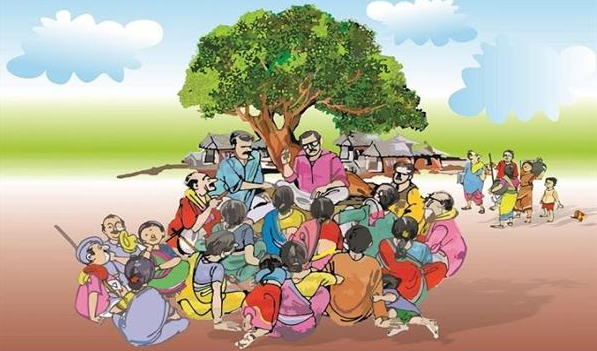Context:
Three decades ago, India witnessed a significant milestone in its governance structure with the implementation of the 73rd and 74th Constitutional Amendments Acts, aimed at empowering local bodies to function as institutions of self-government. The establishment of the Ministry of Panchayati Raj in 2004 further underscored the nation's commitment to bolster rural local governance. However, despite these concerted efforts, the journey towards effective decentralization has been uneven across states, with some making substantial progress while others lag behind.
73rd Constitutional Amendment Act: Empowering Panchayati Raj Institutions
The 73rd Constitutional Amendment Act, 1992, institutionalized Panchayati Raj Institutions within the framework of the Indian Constitution. This pivotal amendment introduced Part IX, encompassing Articles 243 to 243-O, thereby establishing a comprehensive structure for the functioning of Panchayats. Moreover, it introduced the 11th Schedule, which delineates 29 functional domains of Panchayats, facilitating their role in local governance and development.
74th Constitutional Amendment Act: Strengthening Urban Local Governance
In a significant move, the 74th Constitutional Amendment Act, passed during the tenure of the P.V. Narsimha Rao government in 1992, bestowed constitutional status upon urban local governments. This transformative amendment, effective from June 1, 1993, inserted Part IX-A, comprising Articles 243-P to 243-ZG, thereby laying down the constitutional framework for urban local bodies. Additionally, it introduced the 12th Schedule, outlining 18 functional responsibilities of Municipalities, reinforcing their role in managing urban affairs and fostering local development.
Analysis of Devolution Status:
Assessing the status of devolution reveals a mixed landscape, where the commitment of state governments plays a pivotal role in the success of Panchayati Raj institutions. While some states have embraced decentralization fervently, others have been less proactive. The constitutional amendments laid down specific provisions for fiscal devolution, emphasizing the importance of generating own revenues by local bodies. However, data indicates that despite these provisions, Panchayats still heavily rely on grants from both the Centre and states, with only a negligible portion of revenue being generated through taxes. This disparity underscores the need for a deeper examination of the factors hindering Panchayats' ability to become financially self-sufficient.
Avenues for Own Source of Revenue:
The report of the expert committee on own source of revenue (OSR) sheds light on various avenues available to Panchayats for revenue generation. State Acts have incorporated provisions for both tax and non-tax revenue, including property tax, cess on land revenue, and user charges for services. Panchayats are encouraged to leverage these avenues effectively, establishing robust financial regulations and mechanisms for tax collection. Additionally, there exists significant potential in non-tax revenue streams such as fees, rent, and income from investments. Innovative projects like rural business hubs and renewable energy initiatives further expand the scope for revenue generation, presenting Panchayats with diverse opportunities to enhance their financial independence.
The Role of Gram Sabhas:
Gram Sabhas emerge as vital actors in fostering self-sufficiency and sustainable development at the grassroots level. Empowered with decision-making authority, they can play a pivotal role in planning and implementing revenue-generating initiatives tailored to local needs. By imposing taxes and fees, Gram Sabhas can direct funds towards community development projects and public services, ensuring accountability and transparency in financial management. Moreover, they serve as catalysts for entrepreneurship and forge partnerships with external stakeholders, thereby amplifying the impact of revenue generation efforts. However, discrepancies in the authority granted to different tiers of Panchayats pose challenges to equitable revenue sharing, highlighting the need for comprehensive reforms.
Overcoming Dependency Syndrome:
Despite the myriad avenues for revenue generation, Panchayats encounter numerous obstacles, including a prevalent 'freebie culture' and reluctance among elected representatives to impose taxes. Addressing this challenge requires concerted efforts to educate both officials and the public on the importance of self-reliance in local governance. By minimizing the dependency on grants and fostering a culture of financial autonomy, Panchayats can pave the way for sustainable development and effective self-governance. This transition demands collaborative efforts at all levels of governance, signaling a paradigm shift towards a more empowered and self-sufficient grassroots governance model.
Conclusion:
In conclusion, the journey towards empowering Panchayats as self-governing institutions has been characterized by progress as well as challenges. While constitutional amendments and policy initiatives have laid the groundwork for decentralization, the actualization of financial autonomy remains a formidable task. By tapping into diverse revenue streams, empowering Gram Sabhas, and overcoming dependency on grants, Panchayats can transition towards self-sufficiency and foster inclusive development at the grassroots level. This necessitates a concerted effort from all stakeholders, reaffirming the pivotal role of local governance in India's democratic fabric.
|
Probable Questions for UPSC Mains Exam 1. Discuss the significance of the 73rd and 74th Constitutional Amendment Acts in empowering local governance in India. Evaluate the progress made in decentralization across different states and analyze the challenges hindering the effective implementation of financial autonomy for Panchayats. (10 marks) 2. How can the concept of Own Source of Revenue (OSR) contribute to strengthening Panchayats as self-governing institutions? Examine the potential avenues available for revenue generation by Panchayats and assess the role of Gram Sabhas in fostering financial independence at the grassroots level. (15 marks |
Source – The Hindu







